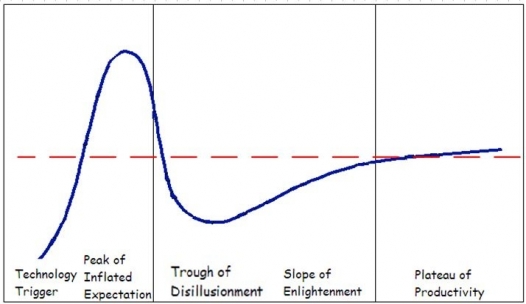This is part 2 of the series – Revelation & Hype Cycles,
This whole project actually got started more than 13 years ago.
 I'll put the 2016 updates in text like this so you can identify it.
I'll put the 2016 updates in text like this so you can identify it.After the introduction, you’re probably wondering what this hype cycle is all about.

It’s pretty simple. Obviously, there are 5 segments to it.
As you read through these, if you’re already a Christian – think about your own experiences, like with reading the Bible and what you’ve expected after that. You’ll probably see yourself as having gone through these very feelings.
If you’re not a Christian – this will give you an idea of what to expect, and let you know that if / when you feel discouraged or wondering about things as you move along – you’re not alone. It’s part of the process of getting to know / believe / follow Jesus.
- It starts with what The Gartner Group called the “technology trigger” – which is nothing more than the “thing” that caught people’s attention and got the cycle started (or not if it was a complete flub and didn’t even get noticed). At this point – people don’t really know what to expect. It’s just hoped that someone notices and wants to know more.
- Next comes the “peak of inflated expectation”. That’s where there’s a whole lot of interest – probably by people who don’t know all that much about the “thing” in question – and before you know it, they expect that it can do everything. Whatever technology problem anyone has – this new “thing” will take care of it. Doesn’t matter what the vendor says – or what the material that comes with it says – people just sort of decide that it can do everything.
- Following that comes the “trough of disillusionment” – which is when people start to realize that – no, that thing really doesn’t do everything. Reality sets in (for the first time). This is a dangerous time for the “thing”. If people’s opinion of it get too far out of control – it’s a pretty quick swing from it can do everything to it can’t do anything.
- Then – hopefully – comes the “slope of enlightenment”. This is where reality sets in for the second time – hopefully, otherwise the “thing” is finished – banished to the scrap heap of good ideas that never quite lived up to expectations, whether they worked or not being irrelevant. This time, reality is more likely to be “real” reality – no wild expectations either way – people know it can’t do everything but also realize that it can do something.
- Finally, if the “thing” survives this long – it reaches the “plateau of productivity”. It has a purpose – people have figured it out – and they like it. All is well, right? Well – not so fast there. It doesn’t show on the chart, but Gartner does talk about the very real possibility that this “thing” can become such a routine way of life that people forget what it was all about in the first place. They take it for granted – they don’t really remember why they liked it so much before – and the next thing anyone realizes, it’s pretty much forgotten about. It’s yesterday’s “thing” – and now people want today’s “thing”. No matter that it’s not the same – no matter that it isn’t as good – it’s today’s and that’s all that counts.
Now there’s a few other things to realize about this hype cycle.
- The technology industry as a whole follows it – all the way through the cycle for a successful “thing”.
Well, they followed it back when I was an IT Director. From the sound of current writeups – maybe that’s not so much the case.
What’s interesting for us though – is that people have realized that it is about people’s behavior – not about the technology itself. As I said – we are going to apply it to Jesus. Jesus has plainly said why He came to earth. There are no surprises. Whether we choose to accept Him at face value of what He said – that’s another question. And it’s that other question that we’re going to look at.
In the IT field – we were always concerned about whether the technology we would adopt would be picked up by others. We got burned by the “clone wars” in the PC business. But the Star Wars kind of clone wars, but the cheap, inexpensive, build your own systems that came out. They were cheaper – initially. As we got to have thousands of them – they all of a sudden got expensive, in terms of the people required to keep them going. Then some of the big boys lowered prices, took care of maintenance and killed off the clones in large organizations. After losing the clone wars – we became very sensitive to what others were doing so we wouldn’t get caught again.
With Jesus – we need to focus this concept on us – whether that be as an individual, our family, our church – but something small. Jesus isn’t going to change. Jesus isn’t going to go out of business. And we can’t afford to not follow or to turn to a Jesus “clone” because others are following that Jesus clone in large numbers. No – Jesus is it. Our only questions in the matter of the hype cycle are this – where are we now / where do we want to be / how to get we from where we are to where we want to be? - But within the industry, different companies follow it at varying speeds – with some adopting new things right away, while others wait, or never do.
- And – within any given company, the same is true for individuals – with some adopting sooner that others and some never getting around to even checking out this new “thing”.
- As the industry, companies and people become familiar with the “thing” and learn more about it – they will advance in their knowledge at varying speeds and at different times. There are “newbies”, people with “some experience” and the “experts”.
With these last three items – the same is true when looking at people and their willingness to even look into, let alone follow, Jesus.I believe that pretty much summarizes the hype cycle. At least it should be enough to understand how I’m going to apply it to Revelation. Since I haven’t actually written the rest – and most of the time don’t know where these things are going until they get there – I may have to update this page later. If I do – I’ll try to remember to put in a note to go back and check it out.
I did end up doing that. In fact, I’ve done a couple revisions of this series, and each time I have made changes to various things. As you go along – you’ll understand why.
Hopefully, as we learn more about Jesus – as we follow Him in our lives – we grow spiritually. We will see things that we’d never even thought about before. And as we do that, we’ll look at out lives and the Seven Letters in different ways. It’s OK. It’s actually good. It is a sign that we are growing.Anyway – time to move on to part 3.
Discover more from God versus religion
Subscribe to get the latest posts sent to your email.

 I'll put the 2016 updates in text like this so you can identify it.
I'll put the 2016 updates in text like this so you can identify it.